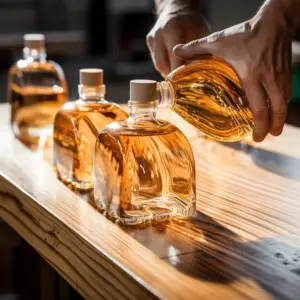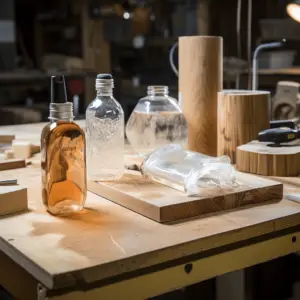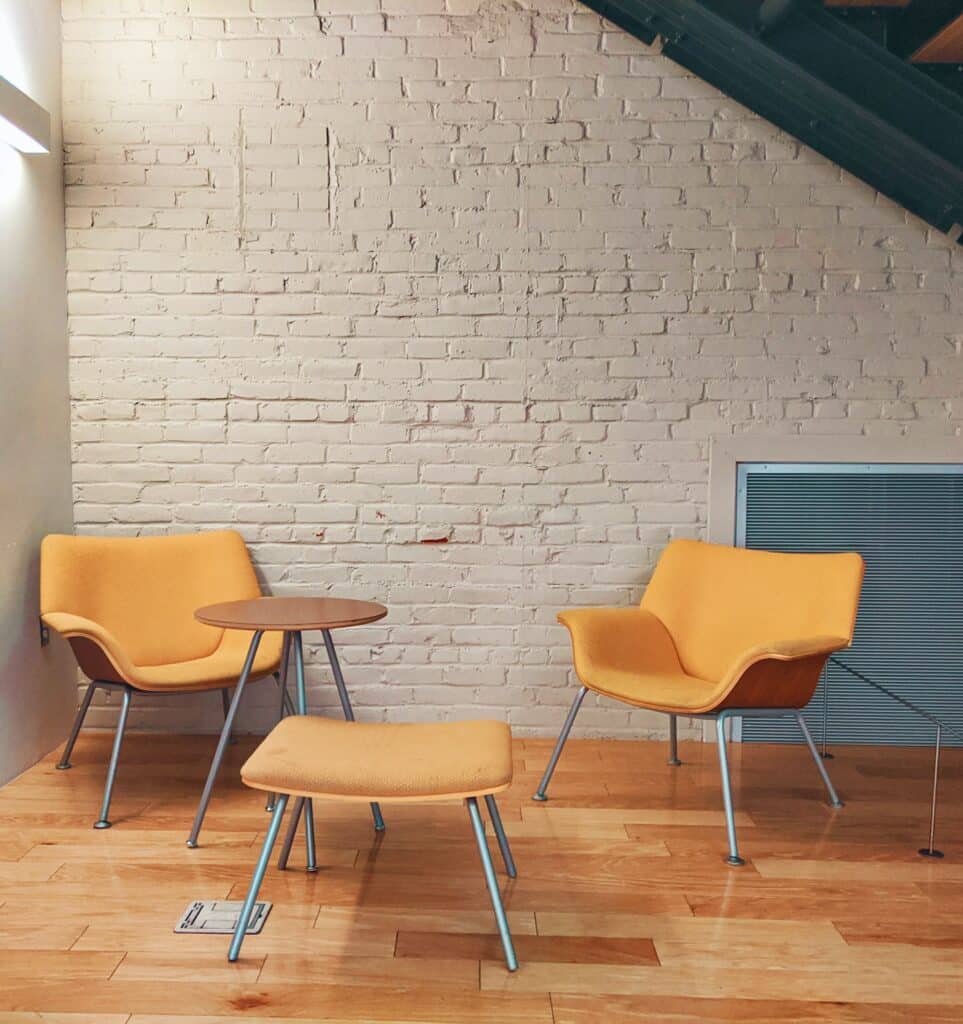Denatured Alcohol in Woodworking alcohol is a pretty strong solvent that is used in many industrial settings. Denatured alcohol is ethanol that has been mixed with other things to make it taste bad, smell bad, and be dangerous for people to drink.
Ethanol, which is also called grain alcohol or ethyl alcohol, is the only alcohol that is safe for humans to drink. It is used in many ways, most famously to make alcoholic drinks.
Denatured alcohol is made by mixing ethanol with things like methanol, gasoline, acetone, isopropyl alcohol, isopropanol, benzene, castor oil, pyridine, methyl ethyl ketone, and methyl isobutyl ketone.
But methanol, which is used to make methyl alcohol, is by far the most common ingredient. The proportion can be anywhere between 10% and 50%. This is why methylated spirit is often another name for altered alcohol.
When people eat methanol, it is very bad for them. When added to ethanol, as little as 10 percent methanol can cause blindness and is generally fatal in most cases. Even though denatured alcohol is dangerous and tastes and smells bad, users have been known to use it as a substitute for alcohol, so it is not safe to keep it around them.
Table of Contents
Uses of Denatured Alcohol in Woodworking

As a Mixing Agent for Shellac
Shellac is a natural resin that has been used in woodworking as a sealant and also as a decorative agent for years. The best mixing agent for shellac is denatured alcohol. Shellac comes in flakes and dissolves very well in denatured alcohol to form a thick paste that can be applied using a brush on bare wood.
The resultant mixture forms a film over the wood protecting it from harsh light, water damage, and other elements. Shellac use has decreased in recent years in favor of polyurethanes and varnishes but expert craftsmen will still use shellac on bespoke and luxurious furniture for indoor use as well as artistic decorative woodwork.
As a Sanding Aid
Denatured alcohol is used to create a smoother surface when sanding down wood which makes for a better overall finish to the wood. Once the wood is sanded down, the sawdust produced is brushed away but much finer wood dust remains present on the surface.
A cloth dipped in undiluted denatured alcohol will clean off the excess fine dust left behind leaving a smoother surface. In addition, denatured alcohol evaporates quickly and this will cause the natural grain of the wood to rise.
Sanding the surface again after cleaning it with denatured alcohol should produce an even smoother surface primed perfectly for the application of a stain, paint, or a finish.
As a Cleaning Agent
Denatured alcohol acts as an excellent cleaning agent for wood surfaces because it is a fairly strong solvent and therefore breaks down the chemical structure of a stain, extricating it from the surface it is adhering to.
Because it is not powerfully corrosive, Denatured Alcohol in Woodworking does not affect the surface being cleaned. It also dissipates or evaporates rather quickly which means it cannot linger on the wood and damage it. Stains such as ink, ketchup, turmeric, and food colorants can adhere to wood quite stubbornly and can be impossible to clean using other softer solvents.
Since denatured alcohol is stronger than acetone, for instance, care must be observed when using it to wipe off stains on wood. Denatured alcohol must never be sprayed or poured directly onto the wood. Instead, lint-free cloth should be dipped in denatured alcohol and used to gently sponge the stain off.
Dyed denatured alcohol or methylated spirits can become a stain themselves if the alcohol is applied directly and left unwiped on wood.
To Remove Scratches
Denatured alcohol can be effective to smooth out small superficial scratches on wood. A good example is the scratches often found on student desks and sometimes on office furniture. The rather shallow scratches can disappear when rubbed using denatured alcohol.
By raising the grain of wood due to quick evaporation a decently forceful rub using a cloth should resolve most scratches.
To Remove Shine and Glue
Most varnishes and finishes can’t be taken off with pure alcohol, and thinners will work faster. Shellac, on the other hand, comes off easily and quickly when you use denatured alcohol.
If you want to update a shellac finish or remove it so you can put on a different finish, denatured alcohol is the best solvent for shellac. It also cleans and smooths the wood’s surface.
Instead of pulling it off or scraping it off, the best way to get rid of dried glue on wood is to wipe it off with denatured alcohol. Dry glue breaks down quickly in pure alcohol and is easy to sponge off.
Skin Contact
Denatured alcohol is not very harmful, but you shouldn’t let it touch your skin if you don’t have to. Most likely, the denatured alcohol used for crafts is more concentrated than the alcohol used in cosmetics.
Even though it won’t burn you right away, it will remove the natural oils that cover your skin and leave it open to irritation, redness, hypersensitivity, and skin problems. When you work with diluted alcohol, you should always wear gloves.
Inhalation

The smell of denatured alcohol is distinct and fumes cannot go unnoticed. Working with denatured alcohol without face protection can be very uncomfortable and the fumes can cause nausea and drowsiness given prolonged exposure.
While some people claim to get used to the smell, inhaling the fumes is also not recommended as this can cause respiratory health problems both in the short and the long term.
When using denatured alcohol, always wear protection to prevent inhalation.
Ingestion
Denatured Alcohol in Woodworking drink diluted alcohol, you will definitely get sick right away. It you will feel sick, throw up, have severe pain, become disoriented, have heart beats, go blind, and maybe even die. If this happens, you should get medical help right away.
Storage
Denatured alcohol is specifically indicated based on composition and concentration which means there is denatured alcohol for different uses including domestic use. For utmost safety, only use denatured alcohol when certain of the classification and always store it away from flames, direct sunlight, children, and pets.


